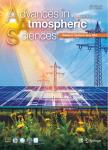Atmospheric Warming Slowdown during 1998-2013 Associated with Increasing Ocean Heat Content
Atmospheric Warming Slowdown during 1998-2013 Associated with Increasing Ocean Heat Content作者机构:Key Laboratory for Semi-Arid Climate Change of the Ministry of Education College of Atmospheric SciencesLanzhou University
出 版 物:《Advances in Atmospheric Sciences》 (大气科学进展(英文版))
年 卷 期:2019年第36卷第11期
页 面:1188-1202,I0006,I0007,I0008,I0009,I0010,I0011页
核心收录:
学科分类:07[理学] 0706[理学-大气科学] 0816[工学-测绘科学与技术] 0825[工学-航空宇航科学与技术] 0702[理学-物理学]
基 金:supported by the National Science Foundation of China (Grant Nos. 41521004, 41575006 and 41705047) the China 111 project (Grant No. B13045) the Foundation of the Key Laboratory for Semi-Arid Climate Change of the Ministry of Education in Lanzhou University from the Fundamental Research Funds for the Central Universities (Grant No. lzujbky-2017-bt04)
主 题:warming slowdown ocean heat content box model heat transport
摘 要:Although atmospheric greenhouse gas concentrations continuously increased, there was relatively little change in global-averaged surface temperatures from 1998 to 2013, which is known as atmospheric warming slowdown. For further understanding the mechanism involved, we explored the energy redistribution between the atmosphere and ocean in different latitudes and depths by using data analysis as well as simulations of a coupled atmosphere–ocean box model. The results revealed that, compared with observational changes of ocean heat content (OHC) associated with rapid warming, the OHC changes related to warming slowdown are relatively larger in multiple ocean basins, particularly in the deeper layer of the Atlantic. The coupled box model also showed that there is a larger increasing trend of OHC under the warming slowdown scenario than the rapid warming scenario. Particularly, during the warming slowdown period, the heat storage in the deeper ocean increases faster than the ocean heat uptake in the surface ocean. The simulations indicated that the warming patterns under the two scenarios are accompanied by distinct outgoing longwave radiation and atmospheric meridional heat transport, as well as other related processes, thus leading to different characteristics of ocean heat uptake. Due to the global energy balance, we suggest this slowdown has a tight relationship with the accelerated heat transport into the global ocean.



